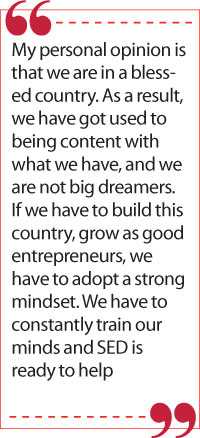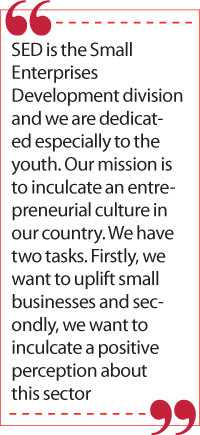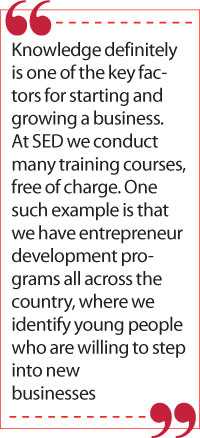Wednesday Feb 18, 2026
Wednesday Feb 18, 2026
Thursday, 7 January 2021 00:00 - - {{hitsCtrl.values.hits}}

Ministry of Sports and Youth Affairs Small Enterprise Development (SED) Director Sudheera Jayarathna
Sudheera Jayarathna is the Director of Small Enterprise Development (SED) of the Ministry of Sports and Youth Affairs from 2012 to present. He was previously the Deputy Director General of HR and Admin of Sri Lanka Rupavahini Corporation, Assistant Secretary of the Public Service Commission, Acting Commissioner of Prisons, Assistant Secretary of the Ministry of Mass Media and Information, Acting Press Commissioner for the Sri Lanka Press Council, Acting HR Director for Sri Lanka Rupavahini Corporation, Acting Director for the Institute of Lanka Puvath and Assistant Director of the Rehabilitation of Persons, Properties and Industries Authority (RIPPIA). With an MBA from Rajarata University and MA in Sociology from the University of Kelaniya, he is the best person to speak to in order to understand the role of micro-level industries in ‘Restarting Sri Lanka’.
Following are excerpts of an interview:
Q: Only 2.8% of the population of Sri Lanka is engaged in the micro-level start up industry, which is very low compared to the rest of the South Asian region. Something that not many people know is that we have an organisation to look after these business. Can you tell us about SED and its role?
SED is the Small Enterprises Development division and we are dedicated especially to the youth. Our mission is to inculcate an entrepreneurial culture in our country. We have two tasks. Firstly, we want to uplift small businesses and secondly, we want to inculcate a positive perception about this sector. In our country, the percentage who enter the business sector is very low.
There are many reasons for this. It can be cultural, social or political reasons. If you look at other countries such as Japan and Korea, small businesses are created alongside big businesses. In Sri Lanka, there is a lack of these big businesses. We have the essential factors for a business, but the attitudes and thinking patterns of society need to be changed. Therefore, Government intervention became necessary and they brought in a policy for a framework to help Small and Medium Enterprises.
There are some points emphasised by this framework. The first is to create an enabling environment. The second is to create an entrepreneurial mentality among the youth – to provide knowledge and skills. Then such a person needs to have a platform to receive the best technology to innovate. We should then help the entrepreneur when he or she enters the market, by getting involved in the marketing aspects at the early stages of the business. In addition, a business can be started with a small capital, but at some point, it needs financial support in order to grow.
 |
 |
 |
 |
 |
Then comes Research and Development. Small businesses are scattered. They cannot conduct research and seek knowledge by themselves. Therefore, this aspect should be looked over by another group. We need the support from many other ministries for small enterprise development, as it requires a holistic approach. This is the role the government should take. At SED we give the knowledge to the youth, and coordinate with them through support services.
Q: General statistics show that about 50% of small enterprises fail within the first year of inception. Successful businesses come with business background and education. Is this failure rate a result of not committing to gaining knowledge and how does SED help here?
Knowledge definitely is one of the key factors for starting and growing a business. At SED we conduct many training courses, free of charge. One such example is that we have entrepreneur development programs all across the country, where we identify young people who are willing to step into new businesses.
These workshops go for about 12 days, and are sponsored by the State. We not only give them the knowledge and training but we also help them understand who they are, and what their potential is. We then help them develop a business plan according to their ideas. Following which, we guide them to banks to receive financial loans and continuously follow up with them. It’s like a mentorship program.
Q: You have been in this position for the past eight years. What has inspired you to continue here?
When I joined, even I didn’t know much about the small enterprise sector. I was attracted by the word ‘enterprise’. There were 86 officers attached to SED and we worked in 16 districts of the country. Today we are present in every divisional secretariat with over 1,100 staff members, and over 90 of them are young graduates who brought their knowledge and skills to the division.
We have created a network that covers the whole island. We also have the best up-to-date data about the small enterprises in Sri Lanka inclusive of about 160,000 small enterprises, which is being constantly updated. This sector has a long way to go, and I want to fulfil the responsibility that I undertook.
Q: The pandemic deeply affected the small enterprises. Some businesses must have just started. Followed by all the financial losses, they get demotivated. What were the steps you took to help them survive this situation?
We spoke to around 13,500 businesses during this time, and they were psychologically under pressure. It is hard for small businesses to continue without capital, and COVID-19 hit Sri Lanka close to Avurudu season. This season is usually the best time for small enterprises, because most of them are in the garment and food business. With the pandemic, they couldn’t sell the stocks they had. We evaluated these issues, and gave them the support needed during the most critical situation.
We used the network we have in the divisional secretariats, and connected people. For example, someone who had a vehicle was connected to food suppliers so that they could distribute the supply. Entrepreneurship also means turning a challenge into an opportunity and this is what we did.
Then we created pages for the Divisional Secretariats on Facebook and published about all these supplies. If you go to these pages, you can see all the businesses under their respective divisions. Most imports are strictly limited at present, so there isn’t much choice in the market. But now, this has created an opportunity for local suppliers, and we are coordinating it for them.
At the same time, the suppliers also have a responsibility to provide what the customer wants, quickly and in the best quality. We are also helping them in this aspect by providing knowledge, support and even financial aid. We have a loan scheme for starting businesses to the value of Rs. 500,000, with a donation of Rs. 50,000. So if a person comes to us, we help develop the business plan, educate them, and give a loan for the interest rate of 5.5% from any bank, together with a donation.
Q: What is the criteria to apply for such a loan?
You only have to have the need to start a business, and an idea for a legal business enterprise.
Q: The focus of ‘Restart Sri Lanka’ is also mainly towards the SMEs. The SED too is carrying out a similar venture. Do you see an amalgamation of these two?
Definitely. We have also worked with SLIM before. SLIM Brand Excellence has a category for SMEs, which most small enterprises didn’t know about. We supported them by coordinating this with our network. In addition, we started a program called SED SALON for the 30,000+ members of the salon industry in the country. We did an island wide program with SLIM to share knowledge about customer service, and developing a brand.
While there is an opportunity even now, a business won’t succeed if we don’t fulfil customer needs. Therefore, it is important to read and understand the customer mindset, and build your brand accordingly. This is where SLIM plays a major role. SLIM has a good network of professionals and veterans in the marketing field who are involved with big businesses, which is a good opportunity to create links with the small enterprises. SLIM and SED together can go a long way to restart Sri Lanka.
Q: You implied that the gaps created in the market due to the pandemic can be turned into opportunities. Do you therefore believe that we are in a positive state to create a boost towards restarting the economy?
If you look at it from the perspective of small enterprises, it is spring time! To start a business, there should be a problem that requires a solution, which becomes a business opportunity. In addition, we have constant issues where local produce is not in demand, not valued, and people have expressed a preference for imports. This attitude has shifted, like a secret blessing. People prefer to buy things from a small shop nearby. This has given a huge opportunity for small enterprises. I agree there was damage at the initial stages of the pandemic, but we have to face changes, that’s part of entrepreneurship. This is the time to change. They might not be able to continue with the same business they did, but should take this opportunity to adapt or create new businesses.
Q: What is the success rate from the time you took over, and what is your end goal?
My corporate goal is to ensure that whole of Sri Lanka gets to know about SED. But today I am proud of the fact that we have success stories to relate.
One of the sponsors of the prime time news in a leading media channel is Lakme, a business which was born in Thalawa, Anuradhapura. Chandanalepa is a brand that today partners some of the popular reality shows in the country. These businesses grew with SED.
But my personal view is that this is not enough. For years we worked with a small team. At present, we have expanded, and I firmly believe we can do more, and help people from all over the country. Apart from SED, all other State institutes, and private organisations, have to stand up to support this. The media too has a major role to play. If we all work under one umbrella with a holistic approach, we can build our country.
Q: When a business crashes, despite all the support SED can give, an important factor is for them to psychologically make up their mind to stand up again. What advice and solution can you give them?
Doing a job is quite easy. We receive a salary for the work we commit. In a business, you are taking up a challenge and as such we have to recognise gaps in society or the industry, make sacrifices, look for opportunities and create innovative solutions. There is always a risk in innovation, and if you are not ready to take on that risk, you can’t start a business. You have to take calculated risks and then make sure that you continue without giving up.
Compared to before, there are many support systems. Social media can bring you publicity overnight. We see brands that grow completely within the media landscape. You don’t have to join an institute to get knowledge, you have YouTube. The most important factor is your attitude.
My personal opinion is that we are in a blessed country. As a result, we have got used to being content with what we have, and we are not big dreamers. If we have to build this country, grow as good entrepreneurs, we have to adopt a strong mindset. We have to constantly train our minds and SED is ready to help. My team can go to the doorstep of a business and offer support, we have such an extensive network. We never let anyone down in the SED family, and we try to uplift them.